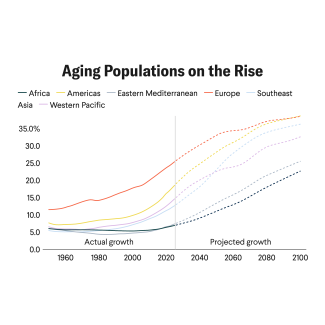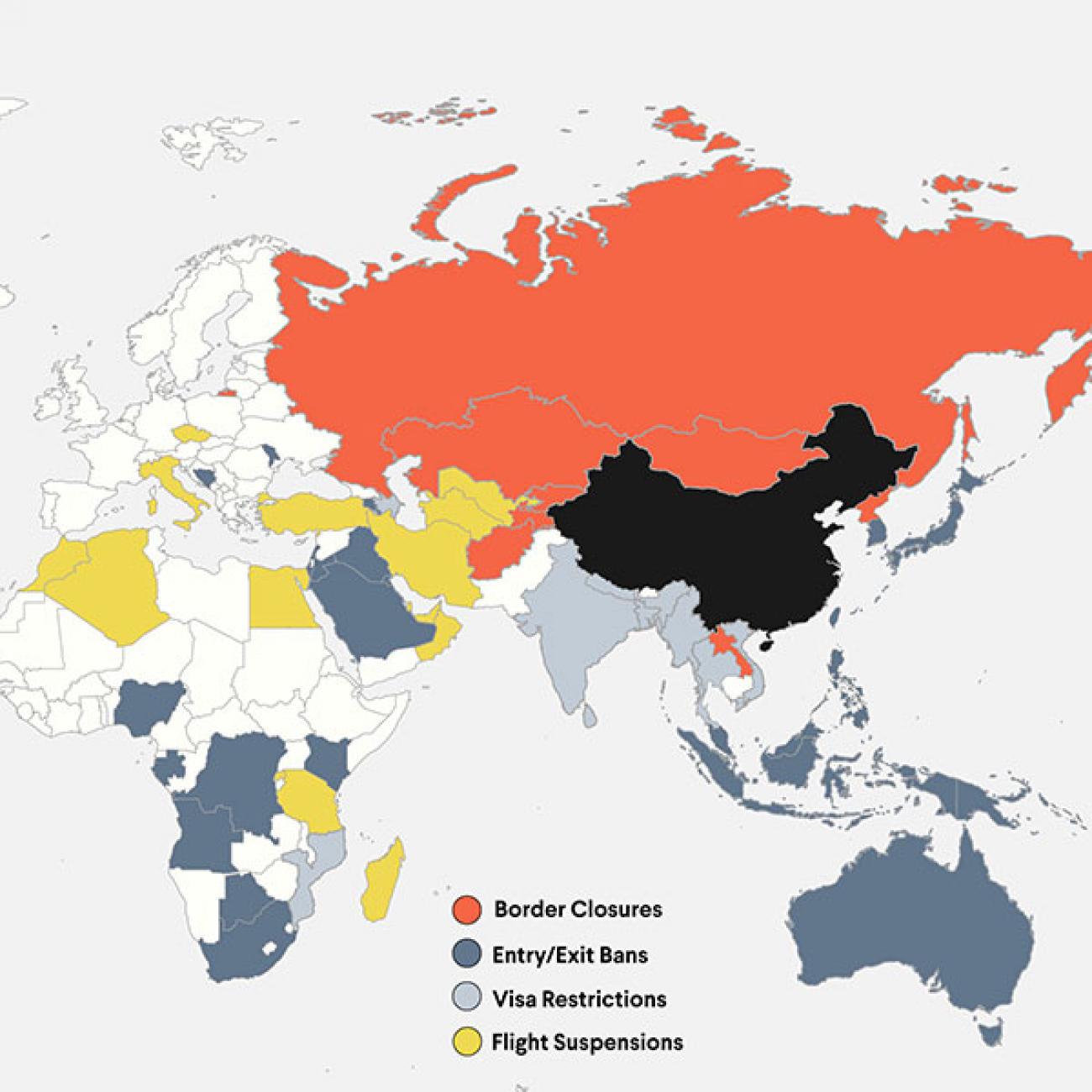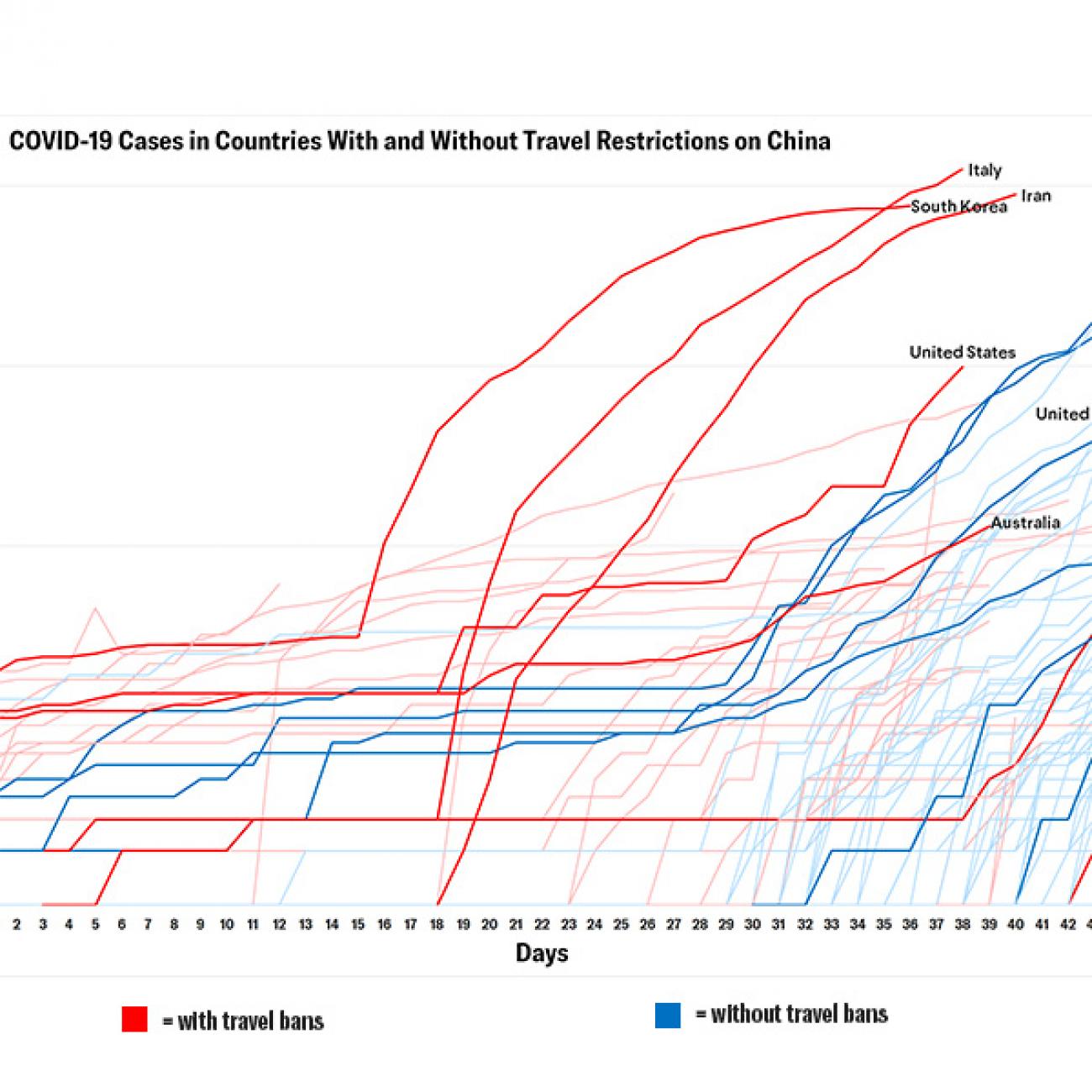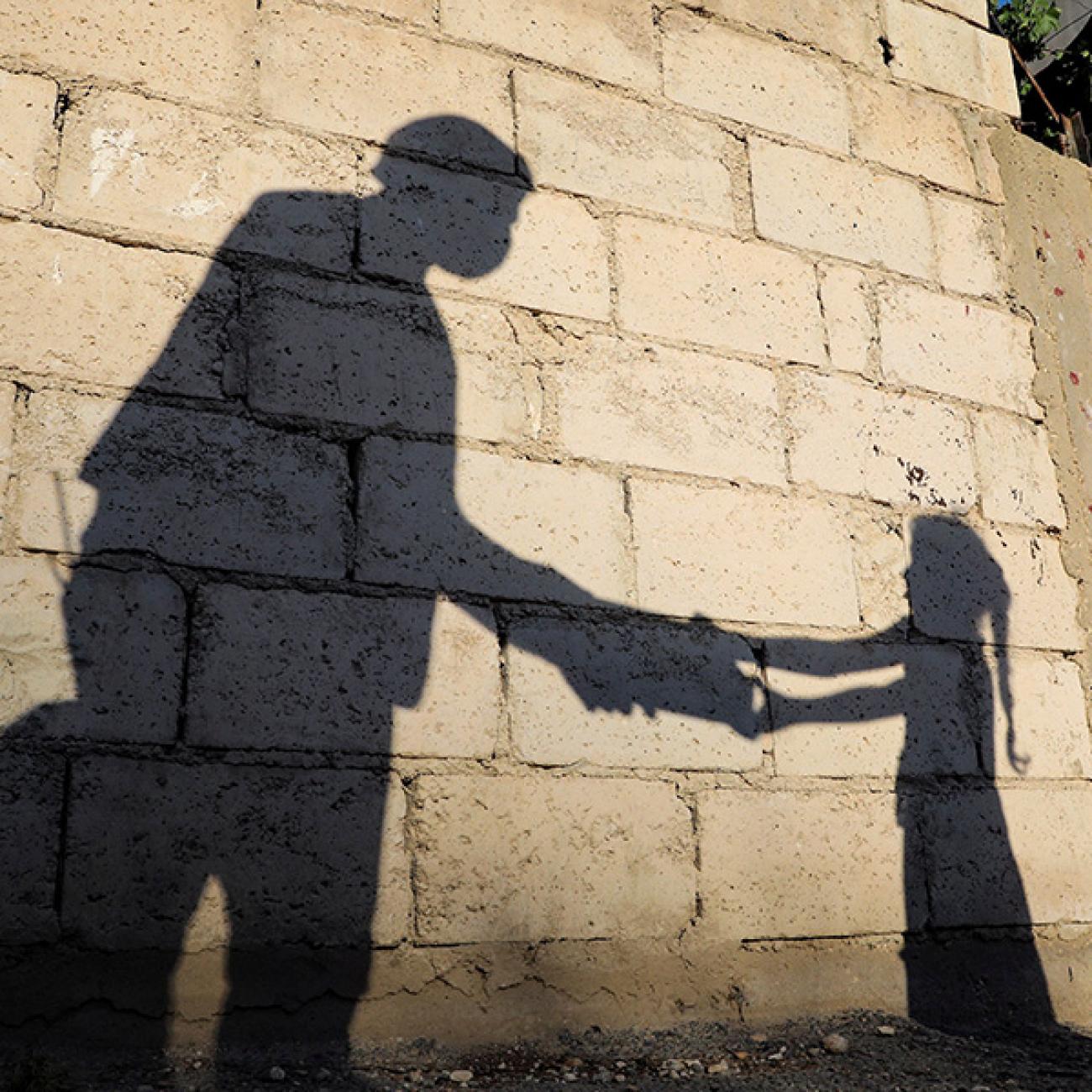When Taiwan recorded its first case of COVID-19 on January 21, 2020, many feared because of its proximity to China, the country would soon be overwhelmed by the virus. That's not what happened. By all accounts, Taiwan has done a remarkable job curbing coronavirus spread, with fewer than five hundred reported cases as of May 15, and no new cases since May 8. Taiwan’s approach to combatting COVID-19 has made waves for another reason as well. An email sent by Taiwan to the World Health Organization (WHO) requesting information about the virus in late December—and the response from the WHO—have become sources of controversy. Think Global Health sat down for a remote interview with Taiwanese Foreign Affairs Minister Jaushieh Joseph Wu to discuss Taiwan’s response to the pandemic, its relationship with the WHO and China, and the upcoming vote at the World Health Assembly on Taiwan’s WHO observer status.
□ □ □ □ □
THINK GLOBAL HEALTH: Taiwan seems to have avoided the major outbreaks seen elsewhere. To what do you attribute that success? What lessons should other governments, including the United States, learn from Taiwan’s success?
WU: The current status is that for thirty-two days already, we don’t have any local cases. And most of the [total] cases—about 440 of them, 80 percent—are imported. Many people are looking at Taiwan as a success story dealing with coronavirus.
As of May 15, most of Taiwan’s coronavirus cases—about 80 percent—were imported
We were hit by SARS [Severe Acute Respiratory Syndrome] back in 2003, and it was a very serious and very painful experience for us. And because of that, we have been staying alert. So when the [Taiwanese] CDC [Centers for Disease Control] officials saw some internet discussions in Wuhan area that there were outbreaks of atypical pneumonia or SARS-like disease, and patients were being treated in isolation, they got very nervous because it sounded like SARS. It sounded like [it could be] transmittable among human beings. So they started asking the WHO for clarification, alerting other people, and we also started setting up our own mechanisms for dealing with possible import cases. We started checking the passengers onboard coming back from Wuhan, and gradually we stepped up our border control, and that seemed to be quite successful.

We also tried to understand the possible route of transmission of this disease, and there were two possible ways. One is through droplets and the other one is through contact. In order for us to stop the transmission through droplets, we started encouraging people to wear masks, and it proved to be very useful. For those confirmed cases, we needed to trace [and] isolate their contacts and put them in quarantine. We developed a high-tech way of tracing all these contacts, and it proved to be very useful as well.
We developed a high-tech way of tracing all these contacts, and it proved to be very useful as well
And another way that, you know, maybe the international community can learn from Taiwan is that when people are put in quarantine, of course, their lives will be disrupted. And in order for them to be able to stay in quarantine centers, I think the central government, local governments, even the village governments need to be mobilized to provide services to those people—for example, laundry, three meals, and things like that. If they need to go to a doctor, there will be people taking them to a doctor to make sure that those people who are supposed to be in quarantine stay in quarantine. These [steps] are very effective in preventing the cases from further transmission, and probably this is a very important lesson for other countries.

And I would also like to mention another factor in Taiwan’s way of dealing with this: its transparency. Taiwan is a democracy, and the Taiwanese government cannot conceal—otherwise, you know, the government is going to be in trouble. Our commander of the CECC, the Central Epidemic Command Center, who is also our health minister, goes on television every day and does live interviews with the press corps in Taiwan. The press can ask all kinds of questions, and the commander will try to elaborate as much as possible.
Through this very transparent way, we create a bond and a trust in between the government and the people, and when the government is telling the people that this is probably something you need to do, people will follow. And when the government says that there is something that we shouldn’t be doing, the people will also follow. So this has become a very effective way for the public to follow the guidance provided by the government.

□ □ □ □ □
THINK GLOBAL HEALTH: With the threat of resurgence, as we’ve seen in many other countries, what is Taiwan doing to prepare? And what do you see as the greatest challenges in the coming months?
WU: If you look at our experience in the last three, four months, most of the cases were imported. So the border controls are already well in place, and they will remain in place unless there are countries that are successfully able to deal with their own coronavirus issues and there’s some trust in between our country and those countries—then we can consider opening up the border. But before we know that the cases are being eliminated or there are no local cases for an extended period of time, I think the border controls will continue to be in place.
All these kinds of mechanisms are going to continue to ensure that Taiwan is going to be safe
And of course, that will affect the economy to a certain degree. So we need to think about how to allow [in] those people who need to be in—and at the same time to ensure that they don’t bring disease in. For example, if there’s an important businessman who is doing business in Taiwan, we need to have a special permit for them. And when they come to Taiwan, they will go through a quarantine process so we are sure there's not going to be a problem. So all these kinds of mechanisms are going to continue to ensure that Taiwan is going to be safe. We need to watch out very carefully that there should be no local transmission, and at the same time the imported cases are being contained.

□ □ □ □ □
THINK GLOBAL HEALTH: I wanted to ask about the communication between Taiwan and the World Health Organization. How has the WHO communicated with and included Taiwan in the pandemic response process, and what could WHO officials have done differently?
WU: This is a very good question, and this is the question that we have been asking ourselves and that we are also asking the WHO officials.
In 2009, the World Health Organization set up a contact point in the IHR [International Health Regulations] so that Taiwan can get in touch with the WHO, and we have been providing regular information through this contact point. But in other countries’ cases, when the information is provided to the WHO through IHR, that information is going to be shared among the member states and that information is going to be made public. But unfortunately, for Taiwan’s case, our information goes to the IHR [contact] and then disappears.
They just sent us a news release. This was not very useful.
At the end of last year we sent an email through this IHR contact alerting [the WHO] that there were SARS-like atypical pneumonia cases and those patients were being treated in isolation. To us, this was a very serious matter. But that email went unanswered. We also sent an email to the Chinese authorities asking them what’s going on, and it was not answered either. They just sent us a news release. This was not very useful. In order for Taiwan to play a more important role in this global health network, Taiwan’s connection with the WHO needs to be treated the same way as other countries. By the same token, Taiwan wants to participate in WHO-related meetings, or mechanism, or activities. We want to receive the same information as other countries

The Taiwan people want to be treated the same as other countries, and that is the best way for Taiwan to be able to deal with any possible outbreak. We also want to be able to participate in WHO-related activities because we want to help other countries. As many people can see, Taiwan is doing rather well in dealing with this pandemic, and Taiwan may also have the experience or expertise in dealing with other areas, and we want to provide our experience. We want to provide help whenever there’s a possibility.
This is what we want to do: we want to be treated the same as other countries so that we can take action, and we want to be able to help.

□ □ □ □ □
THINK GLOBAL HEALTH: The U.S. press reported initially that Taiwan had warned the WHO about human-to-human transmission, and as you know the World Health Organization representatives have pushed back strongly against that, pointing to the text of the email as merely an inquiry for relevant information. This is a sensitive moment for both Taiwan and WHO, so how will this debate over this email affect their working relationship moving forward?
WU: On the first question, about that email on December 31: indeed, if you look at the email itself without digging a little deeper, it sounds like an inquiry. But if you look at the substance, you know, we mention about SARS-like atypical pneumonia. This itself is an alarm, serious enough. And if you look at another [piece of] content of this email—patients being treated in isolation—only those communicable disease patients will be treated in isolation. Otherwise, you know, it makes no sense to put patients in isolation.

This is not just an inquiry—this is a very serious alert to the WHO. If any medical doctor or any public health expert sees this email, they would sense there’s something terribly wrong in Wuhan. We just wanted to alert the WHO about what we were seeing on the internet, since we didn’t know for sure what was going on in Wuhan. We raised a real concern that these are the reports and that the WHO should dig deeper and then reply to us or send our alerts to other countries if they saw that as a serious indication of a possible outbreak.
□ □ □ □ □
THINK GLOBAL HEALTH: And was there a reply to the email?
WU: There was nothing. Oh, the reply is that, oh, we’ll pass it to the related experts, and that’s it.
□ □ □ □ □
THINK GLOBAL HEALTH: And was there no follow-up on the Taiwanese side to that reply?
WU: No follow up, no follow up. But since we understood that that report on the Internet was serious enough, we started doing onboard checking of the flights coming to Taiwan. We understood that that kind of alert, like SARS, like atypical pneumonia—or patients treated in isolation—is a serious alert for us, so we started doing that and certainly hoped that other countries would do the same.
And then we started our preparation all the way until we set up the command center. We were also checking the development of the cases not only in Wuhan but also in other parts of China. The cases got [high enough] to be alarming. We stopped the flights coming from China. Then we set up a command center. And when we detected the first case coming in from China, we knew that we needed to tighten up our border controls.

□ □ □ □ □
THINK GLOBAL HEALTH: How do you see the vote playing out at the World Health Assembly? What would WHO observer status mean for Taiwan going forward in this pandemic and also in the long term?
WU: This is very important. It’s not just [the] appearance of Taiwan’s health minister in the World Health Assembly. I think this also means one step forward for Taiwan to be able to participate in all WHO-related activities, meetings, or mechanisms. And this is one big step forward for Taiwan to be able to obtain information and to be able to lead with other health authorities on the same footing. This is a very important step forward.
U.N. General Assembly Resolution 2758 doesn’t say anything at all—there’s not even a word—about Taiwan
But for this assembly that is coming up on Monday, we still see difficulties for us to become an observer. I don’t know whether there is going to be a vote taking place because the assembly [will be held online]. It’s different, and whether there will be a time for the assembly to discuss the Taiwan issue is not certain right now. If you look at the attitude of the WHO secretariat, they have been stepping up their opposition to Taiwan’s participation by citing the U.N. General Assembly Resolution 2758, saying that the Taiwan’s participation as an observer is up to the member states. But actually what they are saying is the line provided by China, that China represents Taiwan—and of course, you know, China doesn’t represent Taiwan. If you look at U.N. General Assembly Resolution 2758, it only says the PRC [People’s Republic of China] represent China. It doesn’t say anything at all—there’s not even a word—about Taiwan.

And Taiwan is already a democracy. We have a democratically elected president and also a democratically elected parliament. And we have health authorities, we have a foreign ministry, we have a military, and we have our own currency. And therefore, only the democratically elected government has the authority to represent Taiwan. And for the WHO to say that it’s up to the member states—I think it’s wrong.
Look at our experience in between 2009 and 2016. Our invitation was issued by the secretary-general. So they have the right—they have the authority—to issue an invitation, and we certainly hope that even though there's not much time left, Dr. Tedros can issue an invitation to Taiwan.
□ □ □ □ □
THINK GLOBAL HEALTH: How do you see the vote working out?
WU: I’m not sure there’s going to be a vote taking place, but since I’m not one to discuss hypothetical situations, we can only try to see if there can be more countries, more politicians, more decision makers, or more public opinion from the international community supporting Taiwan. So far the decision makers or the administration of key countries—the United States, Japan, Australia, New Zealand, Canada, the UK, Germany, France—voice their support for Taiwan, and to us this is very encouraging, especially New Zealand. This is the first time they voiced their support for Taiwan, and it came from their deputy prime minister who is also their foreign minister. So this is very encouraging for us.

And if you look at the parliaments throughout the world, ranging from the Baltic states, to Central European states, to Western European states, to Canada, to the United States, down to South America—you know, all these countries do not have formal diplomatic relations with Taiwan, but the parliaments will continue to sign petitions to Dr. Tedros asking them—asking him to invite Taiwan to participate in the World Health Organization.
We also see editorials, one after another, urging the WHO to include Taiwan in this world health community. In the United States alone, we saw in the New York Times, Washington Post, Wall Street Journal, one after another, editorials asking the WHO to include Taiwan. We see editorials as far away as India—you know, we don’t have substantive relations with each other—urging the government to support Taiwan, or urging the WHO to include Taiwan. So this is very encouraging.

□ □ □ □ □
THINK GLOBAL HEALTH: China’s Taiwan affairs office said that Taiwan is using the epidemic to get added to the World Health assembly not out of concern about public health—but motivated by a political plot "to create two Chinas or one China, one Taiwan." How would you respond to this?
WU: Well, I think this is typical Chinese propaganda. They try to twist the reality for their own purposes. If you look at the way we want Taiwan to be covered by the WHO, it’s very clear, and we don’t try to hide anything. The first is we want to receive information so that Taiwan can be protected by the international community when there is a disease going on. And the second is that we want to be able to help the international community if there is a need for Taiwan to provide assistance. That’s very straightforward. There are no bones about it.
We don’t want China to represent Taiwan
But for China, they continue to claim that Taiwan is part of them. But what we see is that Taiwan is a democracy. We stand on the front lines guarding against the expansion of authoritarianism. They want to take Taiwan over. And if they are able to take Taiwan over through peaceful means—or through forceful means—I think that’s going to affect the rest of the world. The inspiration of Taiwan's people [is] we not only want to survive—we also want to stay as a democracy. And we don’t want China to represent Taiwan.

EDITOR’S NOTE. This interview was conducted via Skype. What is printed here was taken verbatim from the transcript but edited slightly for length and clarity.






